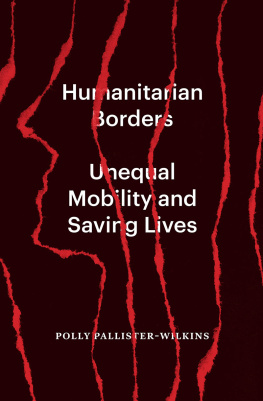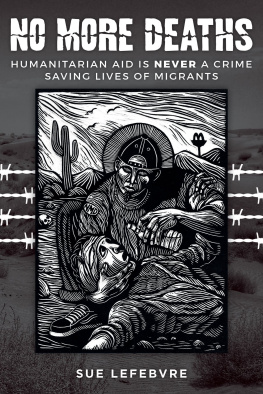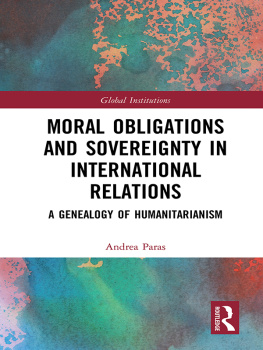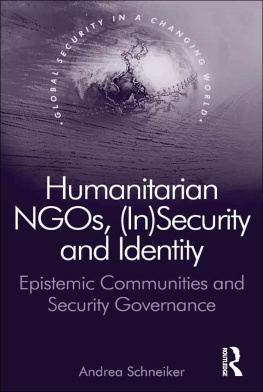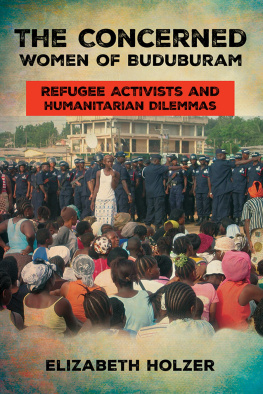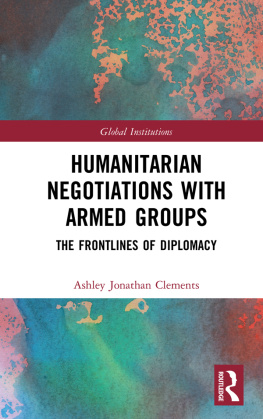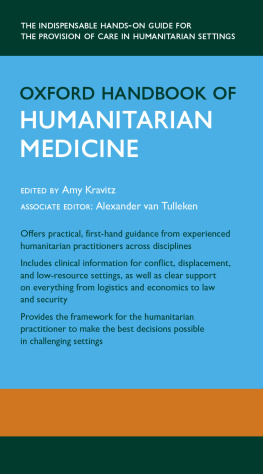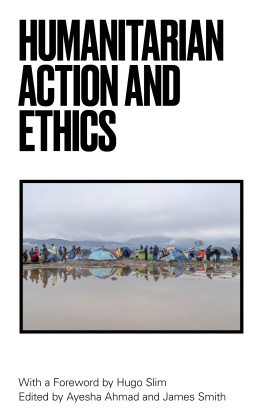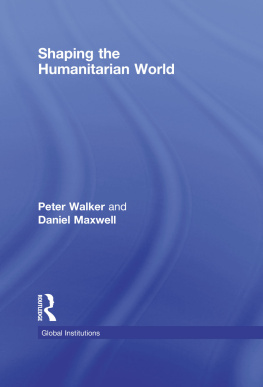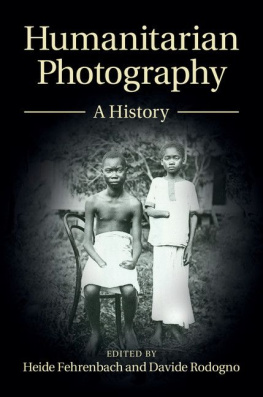Contents

Humanitarian Borders
Humanitarian Borders
Unequal Mobility and Saving Lives
Polly Pallister-Wilkins

First published by Verso 2022
Polly Pallister-Wilkins 2022
All rights reserved
The moral rights of the author have been asserted
1 3 5 7 9 10 8 6 4 2
Verso
UK: 6 Meard Street, London W1F 0EG
US: 388 Atlantic Avenue, Brooklyn NY 11217
versobooks.com
Verso is the imprint of New Left Books
ISBN-13: 978-1-83976-599-5
ISBN-13: 978-1-83976-601-5 (US EBK)
ISBN-13: 978-1-83976-600-8 (UK EBK)
British Library Cataloguing in Publication Data
A catalogue record for this book is available from the British Library
Library of Congress Cataloging-in-Publication Data
A catalog record for this book is available from the Library of Congress
Typeset in Minion by Hewer Text UK Ltd, Edinburgh
Printed and bound by CPI Group (UK) Ltd, Croydon, CR0 4YY
For my father, Bric
19352020
Contents
The Tools of the Global Colour Line:
Passports, Visas and Border Controls
This book is the culmination of many years of research that has benefitted from the input of so many who have shaped and encouraged my thinking along the way.
Firstly, Beste leyen for reading early drafts and encouraging my progress. To Mara Malagodi for always being there since the beginning. Special mention to those friends who have proved invaluable sounding boards, offered unconditional solidarity and the odd bottle or two of whiskey include Anja Franck and Darshan Vigneswaran. Thanks also go to Julien Jeandesboz for the friendship and collaboration.
Along with the guidance of Sebastian Budgen at Verso, special thanks go to Elisa Pascucci and Katerina Rozakou for their close and collaborative reading, to Sharri Plonski for her invaluable comments that pushed me in the direction I knew I needed to go. Thanks also to Afsoun Afsahi for her encouragement, and to James Smith and Tammam Aloudat for their long-running interest in the project. As always thanks to Laleh Khalili for being my continued champion. Thanks also to Reece Jones for all his support and for sharing his book proposal with me.
At the University of Amsterdam, I am indebted to the support of (in no particular order): Rocco Bellanova, Luiza Bialasiewicz, Saskia Bonjour, Dimitris Bouris, Sarah Bracke, Ursula Daxecker, Jeroen Doomernik, Marlies Glasius, Marieke de Goede, John Grin, Imke Harbers, Anja van Heelsum, Barak Kalir, David Laws, Virginie Mamadouh, Hanna Mhlenhoff, Eric Schliesser, Abbey Steele, Nel Vandekerckhove and Floris Vermeulen.
Aspects of this work have been presented to, workshopped with and received feedback from so many over the years, including many of those already mentioned, as well as: Chris Agius, Anthony Amicelle, Louise Amoore, Natasha Anastasiadou, Joseph Trawicki Anderson, Ruben Andersson, Tasniem Anwar, Claudia Aradau, Silvia Aru, Monique Jo Beerli, Alexandra Bousiou, Hanno Brankamp, Karine Ct-Boucher, Paolo Cuttitta, Anne-Marie DAoust, Flavia Dzodan, Shoshana Fine, Christiane Frhlich, Philippe Frowd, Emily Gilbert, David Grondin, Cengiz Gnay, Sophia Hoffmann, Marijn Hoijtink, Ali Howell, Heather Johnson, Maria Gabrielsen Jumbert, Sibel Karada, Pafsanias Karathanasis, Tina Kempin Reuter, Xymena Kurowska, Martin Lemberg-Pedersen, Debbie Lisle, Vivienne Matthies-Boon, Claudio Minca, Katharyne Mitchell, Corinna Mullin, Can Mutlu, Evie Papada, Evthymios Papataxiarchis, Michelle Pace, Nina Perkowski, Alexandra Rijke, Saskia Stachowitsch, Mark B Salter, Kristin Bergtora Sandvik, Tom Scott-Smith, Damien Simonneau, Vicki Squire, Samid Suliman, Ben Tallis, Martina Tazzioli, Ayen stbici, Cecilia Vergnano, Antonis Vradis, William Walters, Natalie Welfens and Chenchen Zhang. Thanks also to my students who have heard many of the arguments made in this book and who have pushed me to refine them.
Much of this book would not have been possible without the support and help of Hernan del Valle, Unni Karunakara, Linn Biorklund, Apostolos Veizis, Aurlie Ponthieu and Marietta Provopoulou. Ilias Papagiannopoulos-Mialousis has been a source of hospitality and help over the years, as has Antonis Vradis. An extra special mention is needed here for Philippa and Eric Kempson. Financial support for some of the fieldwork has come from the Institute for Migration and Ethnic Studies, the Amsterdam Centre for European Studies and the European Research Council.
Finally, thanks go to my family. To my mum Penny for always believing in me, encouraging my curiosity, for listening to my ideas and for being my adventure travel companion. To my father Bric who died of Coronavirus during the final stages of writing this book, thank you for giving me a love of geography and the absurd, for your righteous anger and unwavering sense of justice that continue to fuel me. To my aunt Gilli, who like my father did not get to see this book come into the world in material form, thank you for the love, food and sense of humour. To my family in Aotearoa-New Zealand, hopefully I can deliver copies of this in person soon! Thanks to the Lawy-Thrift family for all their support over the years and last, but definitely not least, thanks to Richard, my rock, shopper, vintner, cat feeder, close reader, comrade-in-struggle, love and partner for life.
It is a September morning in 2012 and the Greek police commander offers a wry smile. I have spent the morning sitting in his smoky office watching grainy video footage documenting the Greek polices daily work rescuing migrants from the nearby river that marks the border with Turkey. Rescue after rescue has been recorded and catalogued by the surveillance cameras strung along the border. For hours, I have watched images of the Greek police and their colleagues from other EU countries, in Greece as part of Joint Operation Poseidon Land, rescue migrants from the river in response to my standard opening question can you tell me about your daily work? intended as an icebreaker. I am sitting in this office in Orestiada in Evros, north-eastern Greece, with its dark wooden furniture and oversized Greek and EU flags, to learn more about how the EU and its member states are controlling their external borders.
Evros, it is argued, is on the frontline, sharing, as it does, a land border with Turkey. I have yet to ask any of my prepared questions about surveillance technologies, the fence being built, operational decisions and working relationships. The Greek police commanders wry smile comes in response to the question: Will these rescues ever stop? I get no more than the wry smile. It is gone midday now, and over the course of the morning, I have been introduced to an aspect of border control I had only recently started hearing about: the humanitarian side.
Often, these detections occur when migrants find themselves in need of rescue by people like the aforementioned police commander and his colleagues.
The day after my encounter with the police commander in Orestiada, I spent the day at Kastanies, one of the official border crossings between Greece and Turkey. Here, I watched Greeks travel backwards and forwards to go shopping in the nearby Turkish city of Edirne. Cars and buses passed freely through the border post adorned with a Welcome to Evros sign and a collection of flags from various European countries. Here, some people chose to stop and pick up last-minute purchases at the Hellenic Duty Free Shop with its sign of bright blue and white lettering and a large orange smile. Cartons of cigarettes, bottles of whisky and large humanoid M&M figures emerged from under the orange smile, contrasting sharply with the previous days footage of migrants being pulled out of the treacherous waters of the Evros river, running only a few hundred metres away. This contrast, like the 352 people known to have lost their lives in this region, is the result of unequal mobility. That is differentiation in who is allowed to move and how they are allowed to move. Put simply, it is who gets to buy M&Ms in duty free shops, and who, at best, gets rescued from drowning or, at worst, becomes an unidentified corpse.

